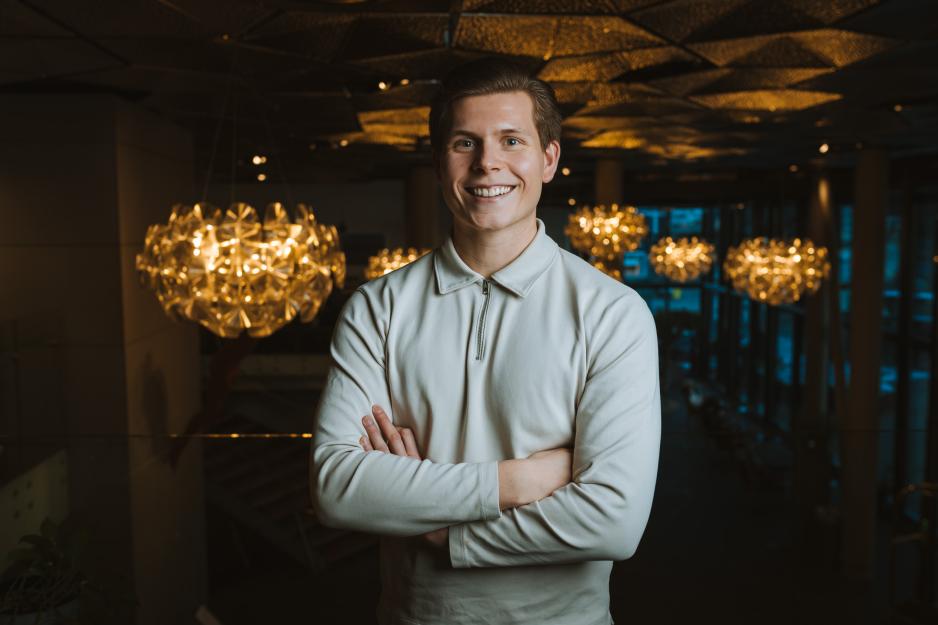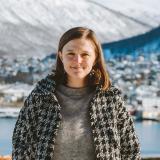Arctic Biotech Startup Develops Sustainable Marine Protein

Founder and CEO of CapiPro Samson Vonen. (Photo: CapriPro)
This is an opinion piece written by an external contributor. The article expresses the writer's opinions. High North News is not responsible for the content of external links.
The fishing industry has formed the backbone of Arctic communities for centuries. Today, you will find fishing communities along the coastline of Northern Norway and the aquaculture sector has completely transformed the economy of the region. Farmed salmon is one of the most valuable exports to the economy and now a group of young entrepreneurs in Bodø wants to make it more green and more sustainable.
Their company is called CapiPro and their solution is to go from waste to value by transforming the sludge from the fish farms into feed for a small worm that they will be the basis in the future fish feed.
Winner of Entrepreneur award
In May 2024, CapiPro was selected as winners of the High North Young Entrepreneur Award that took place during Arctic Congress in Bodø, Norway.
Arctic Economic Council’s executive director Mads Qvist Frederiksen was a part of the selection committee that shortlisted the more than 20 applicants for the award.
“We want to promote entrepreneurship in the Arctic region because the opportunities are immense but it is often the first seed capital that is a challenge to go from idea to business. The High North Young Entrepreneur Award invites young people with the best ideas and startups from across the Arctic region to come and pitch in front of 1200 people,” said Mads Qvist Frederiksen.
Norway is among the world’s largest fishing nations
Like the entrepreneurs from CapiPro, then many of the startups focusing on innovative solutions to make the world a greener and more sustainable place, taking the history and business culture of the region as their starting point.
Increased need for sustainable food
Norway is among the world’s largest fishing nations and one of the key players on the protein market. Every day, around 38 million meals of Norwegian seafood are served around the world, and almost half of them is farmed salmon. Norwegian Seafood Council reported 1.2 million tonnes of salmon sold internationally, valued at NOK 122.5 billion, which accounted for 71% of the total value of all seafood exports in 2023.
However, almost two thirds of the greenhouse gas emissions within the aquaculture industry comes from the feed, according to SINTEF study on greenhouse emissions in the Norwegian salmon product. Most of the fish feed consists of vegetable protein source and vegetable oils and then a smaller part that is fish oils and fishmeal. This generates CO2 emissions that the industry wants to cut down.
Emissions come for example from the land use to produce the soy that is being used as protein and from transporting the feed ingredients to aquaculture sites along the coast.
“Today the customers want not only a tasty salmon at a fair price they also want a product that is less harmful to the climate. The same goes for the industry that want to guarantee a healthy product with low emissions. This is where CapiPro can really make a difference not only to the climate but also to the business case of aquaculture”, said Mads Qvist Frederiksen.
Also read (The text continues)
From waste to profit
The idea to build a company around this opportunity came to three fellow students at Nord University in Bodø. Samson Vonen, Ole Martin Flågan and Isabell Grønnslett established CapiPro before they defended their master theses in Entrepreneurship and Business development.
“We believe in CapiPro that we can make real difference to the north where we are from. Our solution has sprung from our home and experience here in Bodø but it can have global impact,” said one of the founders and CEO of CapiPro Samson Vonen.
The ambition of the young biotech company is develop sustainable protein for animal feed within aquaculture, agriculture and pet food market. They want to do this by using what is today a waste product from the industry, the sludge, and use the otherwise not used sludge as a feed for a small marine worm with the Latin name capitella teleta. This worm can then be the protein used in the feed production instead of other protein sources that has travelled a long way and taken up farmland elsewhere.
“Fish sludge is a waste byproduct consisting of uneaten feed and other organic materials from the on-land fish farms. The small worm capitella teleta can live in the sediments and feed on the sludge. The advantage is that the small worms grow fast and in high density, requiring only one percent of the water needed to produce an equivalent amount of soy protein. After processing it becomes a healthy marine protein powder rich in omega fatty acids, and can be brought back to the fish farms as a feed,” explained Samson Vonen.
And there is plenty of feed for the small worm. Every year in Norway aquaculture industry produces 600 000 tonnes of fish sludge annually. The introduction of new protein sources to the feed can be a gamechanger to the industry. Protein production from capitella generates 90% less CO2 emissions than plant based protein.
It is often challenging to scale up a start-up
Strategic for business development
Nordland county is the second largest salmon producing region in Norway. The CapiPro office is based in the Salmon Center in Bodø. The startup is sharing the office with another 42 companies working within the same office spaces.
“For us this is a strategic place to be. Being in Bodø gives us a good understanding of the market and network. Our facilities need to be where the fish farms are,” says Samson Vonen.
In 2022, CapiPro received NOK 1 million ($93.000) from Innovation Norway to further develop their business idea. CapiPro partnered up with Nord University to use the laboratory facilities. The startup is also cooperating with Akvaplan-niva, the research institute specialising in marine biology in Northern Norway, and in scientific research on use of capitella worm in aquaculture.
Market opportunity abroad
It is often challenging to scale up a start-up but for CapiPro the main challenge might not be the technological solution or lack of capital. They have won several pitching competitions and are testing their solution. Their main challenge however will be the legislation.
Currently the legislation in Norway – and the EU – does not allow the use of fish sludge to farm the small worm capitella. Fish sludge is not covered by the animal by-product regulations and the wate from farmed fish is not included in the definition of manure. So one can not use the fish sludge in the aquaculture even indirectly as in a case of CapiPro.
“This is despite the fact that numerous research from Akvaplan-niva and other research organisations has proven that the capitella fed on fish sludge does not bring any diseases. Fish sludge is a massive resource that is not being utilised. In Norway it is currently being burned as a biogas, which is a huge waste,” said Samson Vonen.
This legislative challenge might force CapiPro to start looking to Canada for market opportunities where it is fish sludge processing is allowed. In the meantime, while this legislative barrier is in place in the EU, CapiPro is looking at using sugar kelp as their feed for the capitella worm.
So what is next for the Norwegian Arctic start-up company?
“We have financially viable business model and a long-term plan. We want to get an investor that is really on our side, has a burning wish to make a change and help the climate and look on a circular side of the business model. We are five people, including two interns. We still have a long way to go, but feel confident. We are working towards a goal in the second quarter of 2025 with the first commercial sales to customers,” said Samson Vonen.


